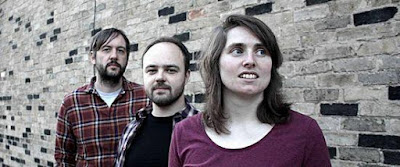Birdie Busch - The Ways We Try (January 1, 2005)
Birdie Busch - Penny Arcade (September 27, 2007)
Emily "Birdie" Busch, "Philadelphia's whimsical, verse-weaving siren," according to NPR, has always had a way with storytelling. Her lyrics are introspective, offbeat, and oozing with sentimentality. The nickname "Birdie" has nothing to do with singing; "it was bestowed upon me by a friend after a beret with metal studs was bestowed upon my head. It had nothing to do with singing, just silliness. So when they ask, 'what came first, the beret or the bird?' I say the beret," she told YellowBirdProject Blog.
After ingratiating herself in Philadelphia's alt-folk scene in the early '00's, Birdie's debut album The Ways We Try was recorded with producer Devin Greenwood (Amos Lee, the Weeds, JF Maher) and released on Bar/None in 2005. At only age 25, Birdie captured the sweetness and complexity of some of America's finest singer/songwriters; A.D. Amorosi in the Philadelphia City Paper described the record as "Not dag funky but odd funky - her crackled rosiness draws you into [the songs] as would a painter's smallest strokes, asides that speak volumes when you stand closer. So get closer." Birdie worked with Devin Greenwood again for her Bar/None follow up album Penny Arcade two years later, recording the bulk of the album at Devin's South Philly home studio (dubbed "The Honey Jar,") imbuing the album with a homey intimacy.
One of the standout songs is “The Huff Singers (North Philly,)” about a gospel singing group Birdie met while waitressing at a gospel brunch. “Mr. Huff, who is in his 80’s, carries a Polaroid camera around and he asked me if he could take my picture and then he gave me the copy. I love to visit the group in their rehearsal space and listen to them swap old time songs and recordings; we have made an effort to bridge the gap between cultures, and it’s a real pleasure for me,” Birdie said at the time.
These days, Birdie Busch continues to perform and record in Philadelphia, with strong support from NPR's Acoustic Cafe and Philly's WXPN. She released her latest album Thunder Bridge in June, 2016, and will be appearing at Ortlieb's in Philadelphia on December 7.
Birdie Busch On Philadelphia:
Philly has been a city that has allowed me time and space to react,
write,record.live, love, and everything in between. It's not a "hustle"
kind of place although it is incredibly diverse and amazing. My
relationship has changed in that I've come to feel more responsible for
my contributions to this place, not only artistically but civically. I
do a lot within the context of my community and use my art and music to
make it all happen, including using albums to raise money for public
schools and also visual art grants, which you can check out at link
below. http://www.emilybirdiebusch.
For
me, the dawn of the Internet had less computer time and more real time.
Not that that wasn't an element of it. But initially, there was a lot of
hanging out at bars, open mics, etc. And when hanging at bars, you were
really there! Ha. No one was looking down at the screens, present
focused energy seemed to still be upheld. Gosh I miss that. The
collective experience without fractured attention.
Philly
has so many amazing musicians and that's always felt like a constant to
me. Right now, I've been really enjoying Rosali Middleman.
I also really love this group that plays a lot of vintage Hawaiian kind of stuff.
But I could honestly send you a long list of great music from Philly of all different feels.
Being
in a smaller city has benefits and setbacks. I have had friends that
left for bigger cities to seek more paid work in music, especially
engineers and people in the production side of things. Many of us here
combine many different things to make our lives work. Music is a huge
part of my vitality, but with the state of music and living here I do a
lot of different things. In the end I think it all informs each other
and strengthens my soul.

















